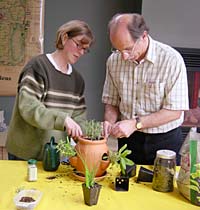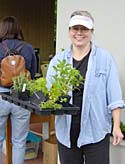Reclaiming our roots through urban farming
by Brian Schaeperkoetter, PCC staff writer
This article was originally published in June 2004

(June 2004) — It’s a perplexing phenomenon. Year after year, city folks continue to lose connection to the land and an understanding of how the food we eat is grown. Day after day, as we visit grocery stores for our food, the roots of past generations who relied on farming to grow their own food supply become faded memories in photo albums or family folklore around the dinner table.
As urban dwellers, how can we reconnect with the land and nurture our knowledge of farming? The answer is simple: start digging dirt.
No space too small
On a sunny, then rainy, spring day last month, a group of 15 city folks gathered at Seattle’s new Bradner Gardens Park to learn the basics of small-scale, urban farming. The one-and-a-half-hour “Urban Herbs” workshop — presented by PCC and Seattle Tilth — showed them how to plant, cultivate and harvest fresh, organic herbs. When the workshop concluded, the newly minted city farmers were armed with the knowledge and materials they needed to start their own herb pots.
“We were looking for ways to teach people how to grow their own food in the city — no matter how limited the space, be it a terrace, patio … even a windowsill,” said Karen Luetjen, Seattle Tilth’s executive director. “Growing herbs was a natural idea, because they’re relatively easy to grow, and they grow year-round in the Northwest’s mild climate.”
The seminar also gave participants a bit more insight to the everyday challenges that organic farmers face — from workaday chores like watering, fertilization and pest control to the delicious rewards that follow the harvest.
“Growing herb pots really is like small-scale farm production,” said Diana Crane, PCC’s community relations manager and “Urban Herbs” participant. “It’s a fun activity — especially for families with young children — that offers the ongoing reward of fresh herbs that are delicious to eat and beautiful to look at. It’s farming reduced to the scale of a windowsill or deck, that serves as a daily reminder of where food on our tables comes from.”
Growing awareness
The “Urban Herbs” seminar underscored many simple reminders that are central to the mission of both PCC and Seattle Tilth — the value of localness, sustainability and nutrition.
“PCC is proud to partner with Seattle Tilth, which does a great job of empowering people in an urban setting to share their experiences with nature,” said PCC Board member Alexander Rist, who attended the workshop. “We are convinced that projects like ‘Urban Herbs’ move us from the state where sustainability is just a concept to a state where sustainability becomes a living experience.

“Sustainability becomes reality as we start to interact with the forces of nature, and we receive — if we learn to do things right — the gift of wonderful herbs, which will spice our daily food.”
It’s no secret that fruit and vegetables, grown locally and eaten right after they are harvested, are tastier and healthier than produce that has been grown and shipped from thousands of miles away. Many modern crops, in fact, are bred to withstand long, nutrition-depleting road trips from farm fields to our dinner plates. This emphasis on durability — rather than flavor and nutritional value — is another great reason for urbanites to buy locally and explore growing their own food.
“As the Northwest’s population grows and more dense urban settings are created, we need to look for new ways to promote healthy, safe urban spaces to grow food,” said Luetjen. “We also need to protect our local organic farms or we’ll have to rely on farmers halfway around the world to provide our food.”
So, take a closer look at that overgrown corner of your backyard. Eyeball your windowsills and front stoops. Take stock of unused flowerbeds and planting strips. Then, close your eyes and imagine rows of freshly planted herbs and vegetables. Who knows? You just might find room in your life for an urban garden of your own.
Learn more For information about urban farming and gardening, visit Seattle Tilth’s Web site at www.seattletilth.org.
